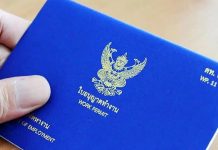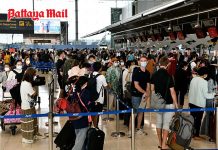BANGKOK, 18 October 2011 – The public relations unit of the Flood Relief Operations Centre (FROC) reported the resolution of the meeting of the post-flood Economic Revival Panel Committee chaired by Deputy Prime Minister and Minister of Commerce Kittiratt Na-Ranong and attended by several organizations such as the Ministry of Finance, the Ministry of Industry, the Ministry of Energy, the Office of the National Economic and Social Development Board (NESDB) and Bank of Thailand (BOT).
Mr Kittiratt said the economy has been severely affected by the floods, but impact could not be assessed into exact number for now. At present the Nava Nakorn Industrial Estate has been inundated and needs to be closely watched. Initial rehabilitation measures begin to be clarified.
Finance Minister Thirachai Phuvanatnaranubala revealed that according to assessments by the BOT and the NESDB, the flood crisis will cause this year’s GDP to drop by 1-1.7% but the whole impact still cannot be concluded since the floods continue to spread to affect more areas. However, if the Economic Revival Panel provides fast-pace economic stimulations right away, the impact is likely to be limited within 1-1.7% of the GDP. As a large production base country, Thailand possibly poses relevant impacts on other countries one way or another. The measures of the economic revival panel are divided into 3 phases. The initial phase is the on-going emergency phase. The second phase involves rehabilitation, and the final one features long-term water control and management. The BOT will take charge of monitoring the financial system to sustain sufficient liquidity while financial institutions will lead their procedures with more flexibility, prepare for post-flood industrial rehabilitation and pay insurance indemnity to their flood-affected clients as soon as possible.
Meanwhile, the Ministry of Finance will extend the period of tax payment form submission and tax payment date which are originally due in December. Also, the ministry will issue regulations allowing MPs to obtain flood prevention budgets, prepare long-term flood prevention budgets as well as labour-related measures.




